Overview
Navigating the mortgage process can feel overwhelming, and understanding the differences between pre-approved and pre-qualified mortgage options is essential for your journey. Pre-qualification offers a quick estimate based on self-reported financial information, which can be a helpful starting point. However, pre-approval takes things a step further by involving a detailed evaluation that includes credit checks and documentation. This process not only provides a clearer picture of your financial standing but also places you in a stronger position when making offers in a competitive market.
We know how challenging this can be, especially when you’re trying to secure the best possible deal for your future home. By choosing pre-approval, you demonstrate to sellers that you are serious and prepared, giving you an edge in negotiations. This commitment can significantly enhance your confidence as you move forward.
Remember, we’re here to support you every step of the way. Whether you opt for pre-qualification or pre-approval, understanding these options will empower you to make informed decisions that align with your family’s needs. Take the next step towards your homeownership goals with clarity and assurance.
Introduction
Navigating today’s competitive real estate market can be overwhelming for homebuyers, and understanding the nuances of mortgage pre-approval and pre-qualification is critical. Both processes are essential steps in securing a home loan, yet they offer distinct advantages that can significantly impact your journey.
We know how challenging this can be, especially with many potential homeowners unaware of these differences. So, how can understanding pre-approval versus pre-qualification empower you to make informed decisions and enhance your purchasing power?
This article delves into the key distinctions between these two options, providing insights that can lead to a more confident and successful homebuying experience.
F5 Mortgage: Personalized Pre-Approval and Pre-Qualification Services
At , we understand how challenging the mortgage process can be. That’s why we excel in providing customized services that explain options, specifically designed to meet the unique needs of each client. By offering a diverse array of loan options—including —we ensure that our advice and solutions resonate with your individual circumstances.
Imagine obtaining pre-approval in less than an hour. Our effective method greatly simplifies the , allowing you to focus on what truly matters. This not only enhances client satisfaction but also empowers families to make informed decisions about their mortgage options. As one satisfied client shared, ‘The team at F5 Mortgage made the process easy and worry-free, guiding me every step of the way.’
With over 70% of homebuyers before starting their house search, our focus on the differences between pre approved vs pre qualified services reflects a growing trend in the industry. Individualized consultations are increasingly recognized as vital for improving client experiences and outcomes. Additionally, understanding the distinction of pre approved vs pre qualified letters, which typically remain valid for 60 to 90 days, can help you plan your property search more efficiently.
Another client remarked, ‘Taking these steps with F5 Mortgage led to into my new home.’ Our dedication to providing a stress-free loan experience shines through in the testimonials from our pleased clients. They emphasize the outstanding service and tailored assistance they received from F5 Mortgage, ensuring a seamless and effective borrowing experience. Remember, we’re here to support you every step of the way.
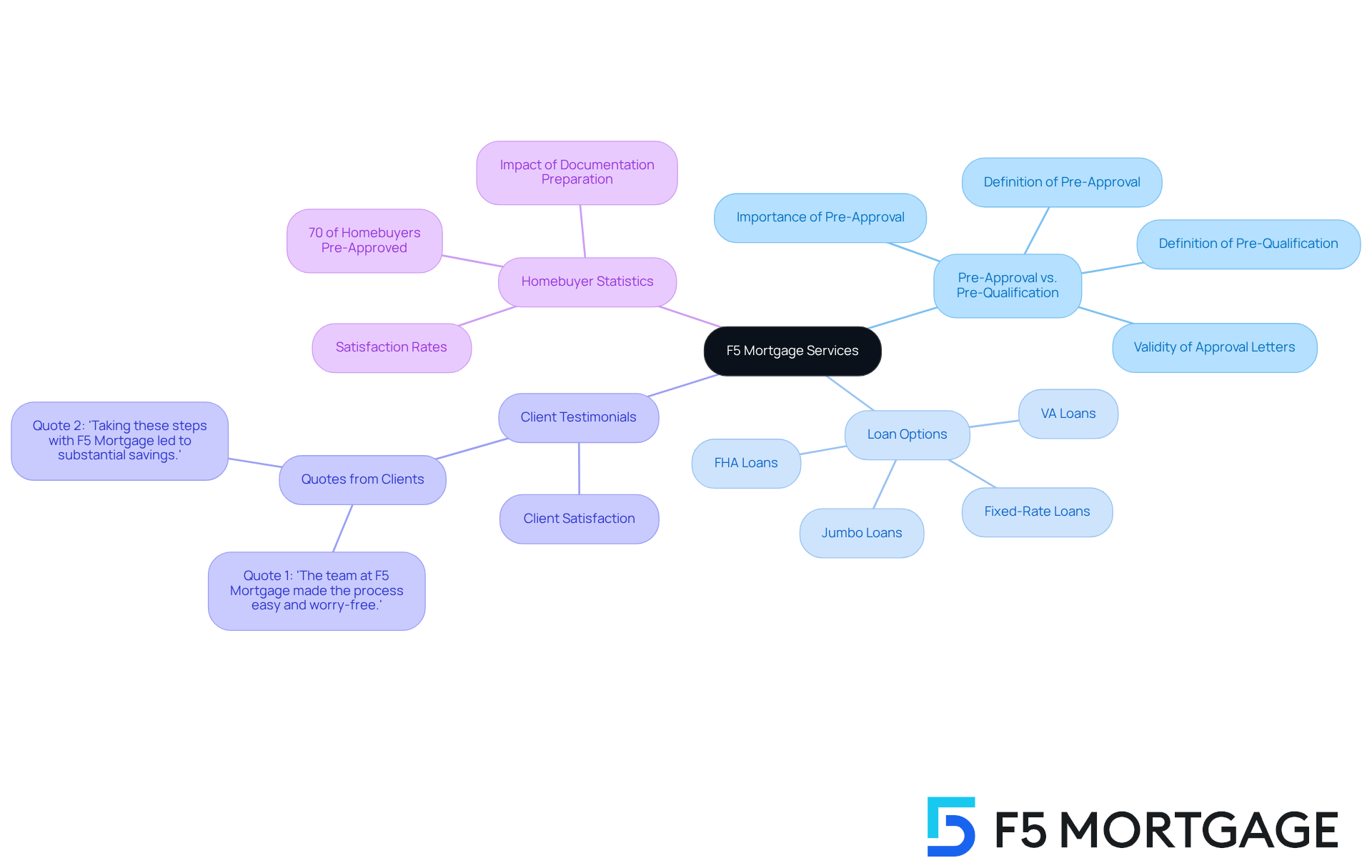
Understanding Pre-Qualification vs. Pre-Approval: Key Definitions
is an important first step in your mortgage journey. It allows lenders to give you an estimate of how much you might be able to borrow, based on the financial information you share. This quick assessment usually requires minimal documentation and can often be completed online or over the phone in just a few minutes. However, we know how challenging this can be, as research indicates that around 60% of are not fully aware of the differences between . This lack of understanding can lead to confusion during your home search.
On the other hand, prior approval involves a more thorough evaluation of your financial situation. This process includes a credit check and verification of your income and assets, resulting in a . Essentially, advance approval provides you with a specific loan amount you may qualify for, giving you a . of grasping these distinctions, as sellers often view pre-approved buyers more favorably.
Imagine being a buyer who has gone through pre-approval. You can confidently make offers on homes, knowing you have the financial backing to support your bid. In contrast, a pre-qualified buyer may face challenges in competitive markets, as their offer does not carry the same level of assurance. Understanding the can significantly impact your homebuying experience, making it essential for potential buyers to grasp the nuances of both methods. We’re here to support you every step of the way as you .
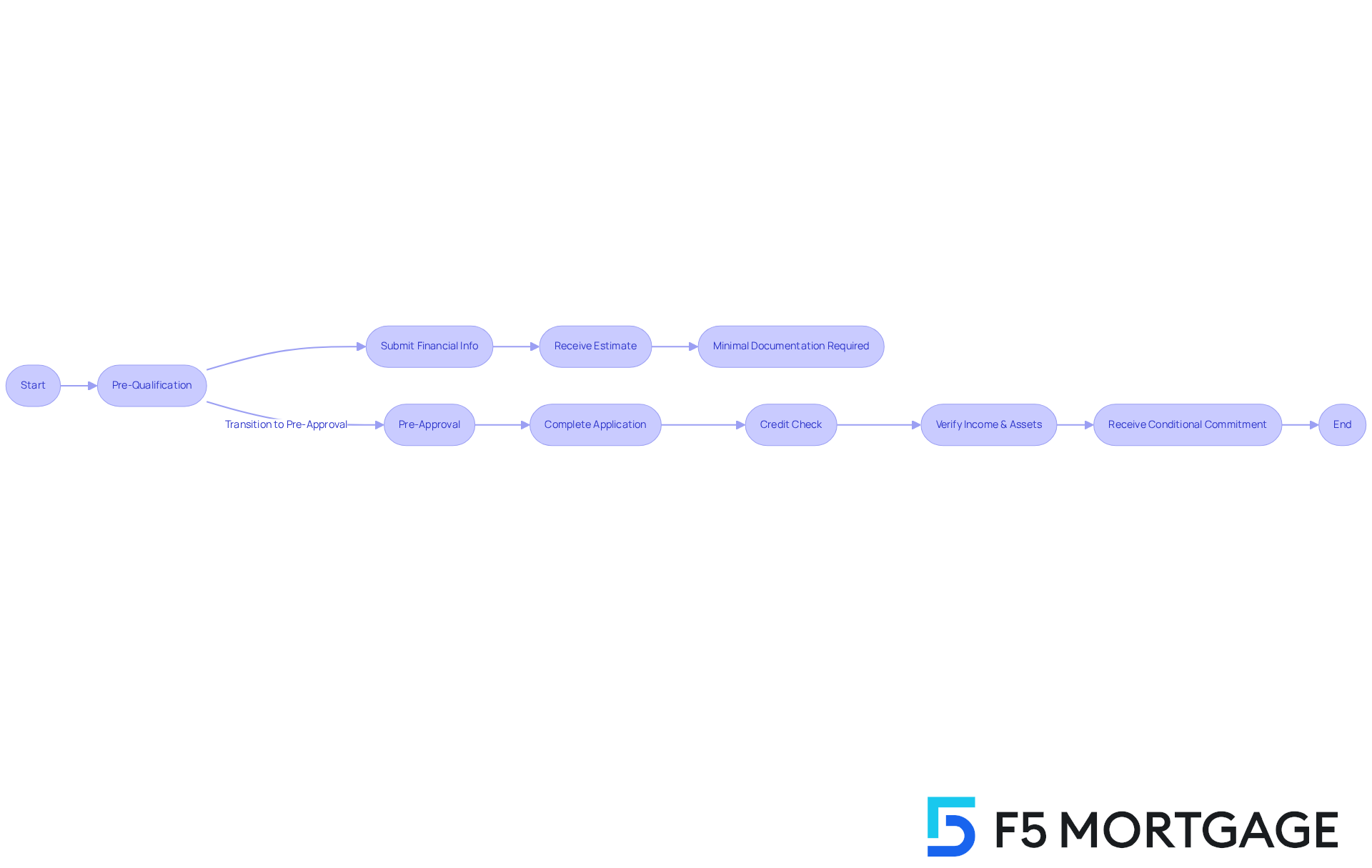
Pre-Qualification Requirements: What Information You Need to Provide
Obtaining can feel overwhelming, but we’re here to support you every step of the way. To start this important process, you’ll need to provide essential financial information, such as your income, debts, and assets. This typically means sharing details like your employment status, monthly expenses, and any existing loans.
While documentation requirements can vary among lenders, common :
- Recent pay stubs
- Tax returns
- Bank statements
Having these documents ready can significantly speed up the , which usually takes about 30 to 60 minutes to complete. We know how challenging this can be, but being prepared can ease your journey.
Statistics show that lenders often require a range of documents. In fact, a recent survey revealed that 85% of lenders ask for at least two years of tax returns and W-2 forms to verify your income. Many lenders also emphasize the importance of maintaining a during this stage, as any significant changes can impact your .
Quotes from industry experts underscore the necessity of being organized:
‘Understanding is one of the first steps toward turning your homeownership dreams into reality.’
This highlights the importance of organizing your , enabling a smoother and more efficient pre-qualification process. Remember, taking these steps can bring you closer to achieving your .
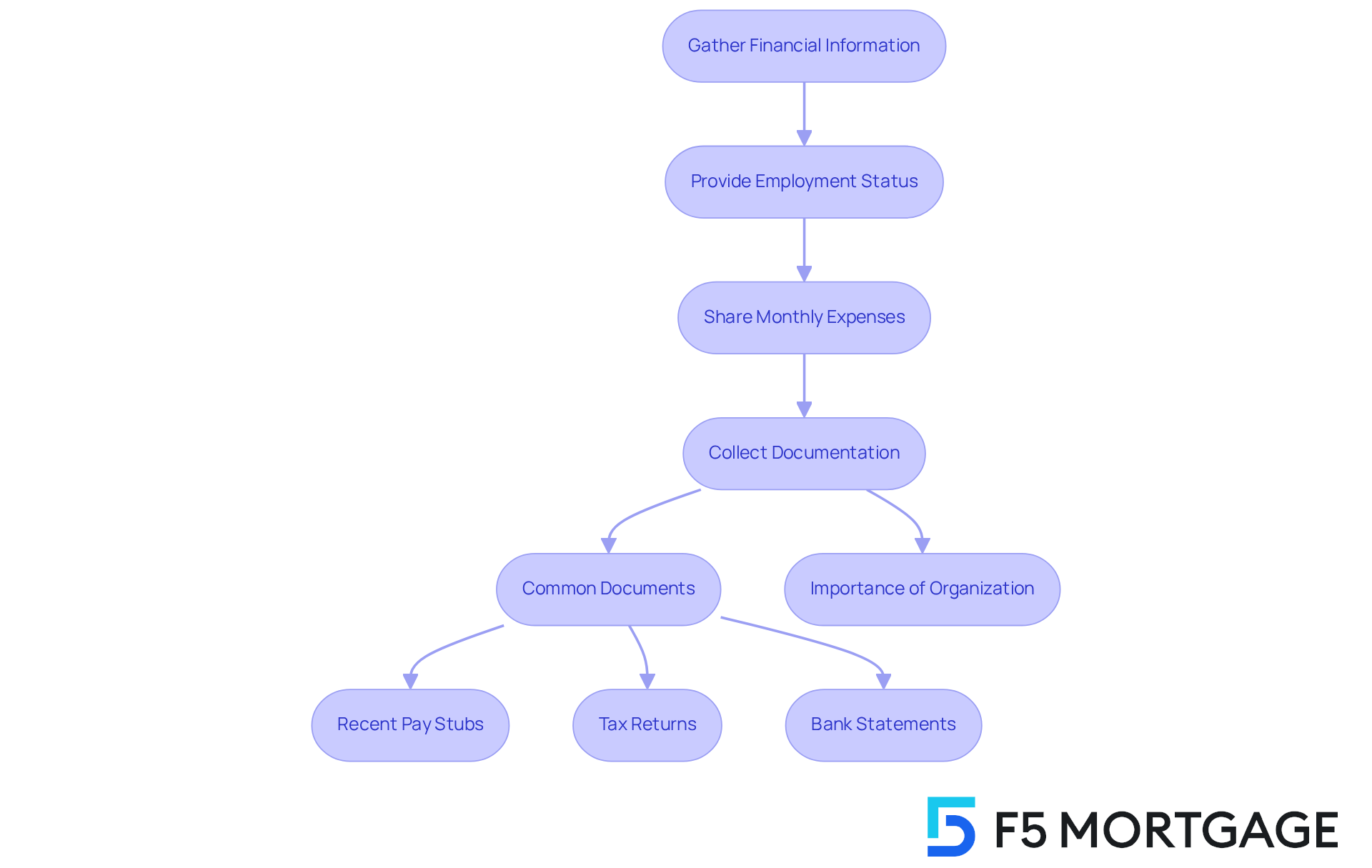
Impact on Credit Score: How Pre-Approval Affects Your Financial Standing
Requesting pre-approval for a loan can feel daunting, especially when comparing options, and it often leads to a . This may cause a temporary drop in your credit score, typically by three to five points. While this impact is generally minor and short-lived, we know how concerning it can be. If you maintain , you can recover quickly.
On the other hand, when comparing pre approved vs pre qualified, the latter involves a at all. Understanding the is crucial for managing your credit effectively during the home buying process. For instance, while a hard inquiry can remain on your credit report for up to two years, its effect on your score diminishes after the first year.
Moreover, credit agencies allow several hard inquiries for loan applications within a 30-day period to count as just one inquiry. This means you can without greatly damaging your credit status. As you navigate the mortgage landscape, being aware of these factors can empower you to that align with your financial goals.
To enhance your likelihood of , consider seeking prior approval from various lenders, such as . They are recognized for their and tailored service, which can help you feel more secure in your journey. Remember, we’re here to support you every step of the way.
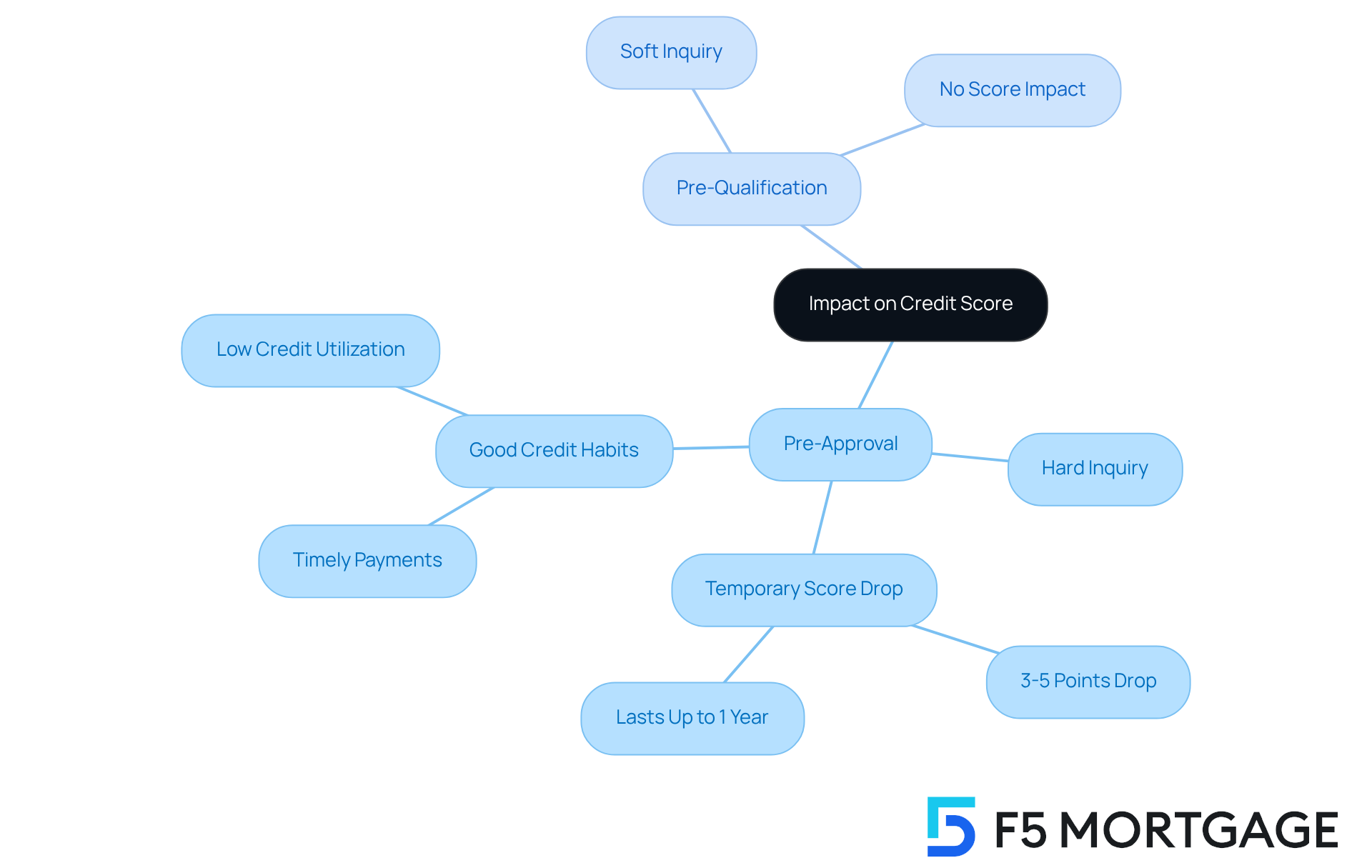
Timeline Comparison: How Long Does Pre-Qualification and Pre-Approval Take?
We know how challenging the mortgage process can be, but when considering , pre-qualification can often be completed in just a few minutes. This process primarily relies on self-reported information, making it a quick first step. In contrast, the prior authorization process typically takes longer, ranging from the same day to three days. This timeline depends on the lender’s requirements and the completeness of the documentation provided.
For instance, once all required documents are submitted, many lenders can respond within hours. However, others may take up to three days to complete the approval process. Grasping these timelines is essential for potential buyers. can be the difference between obtaining your ideal property or missing out on competing offers.
A preliminary approval letter not only enhances credibility with REALTORS® but also clarifies budget limitations in the context of pre approved vs pre qualified options. Understanding your is crucial, especially since it should ideally be under 43% for advantageous mortgage rates. With , it’s essential to act promptly to secure your desired home within this timeframe.
Furthermore, it’s recommended to seek to preserve a healthy credit score. Multiple inquiries can adversely affect your score. As Pappy Johnson, a VP Senior Mortgage Loan Officer at , emphasizes, ‘Obtaining a is crucial for prospective homebuyers.’ Factors such as credit score and DTI play significant roles in the . Therefore, it’s important for buyers to be aware of their financial standing and explore refinancing options available through F5 Mortgage, such as or , which can provide more accessible pathways to homeownership.
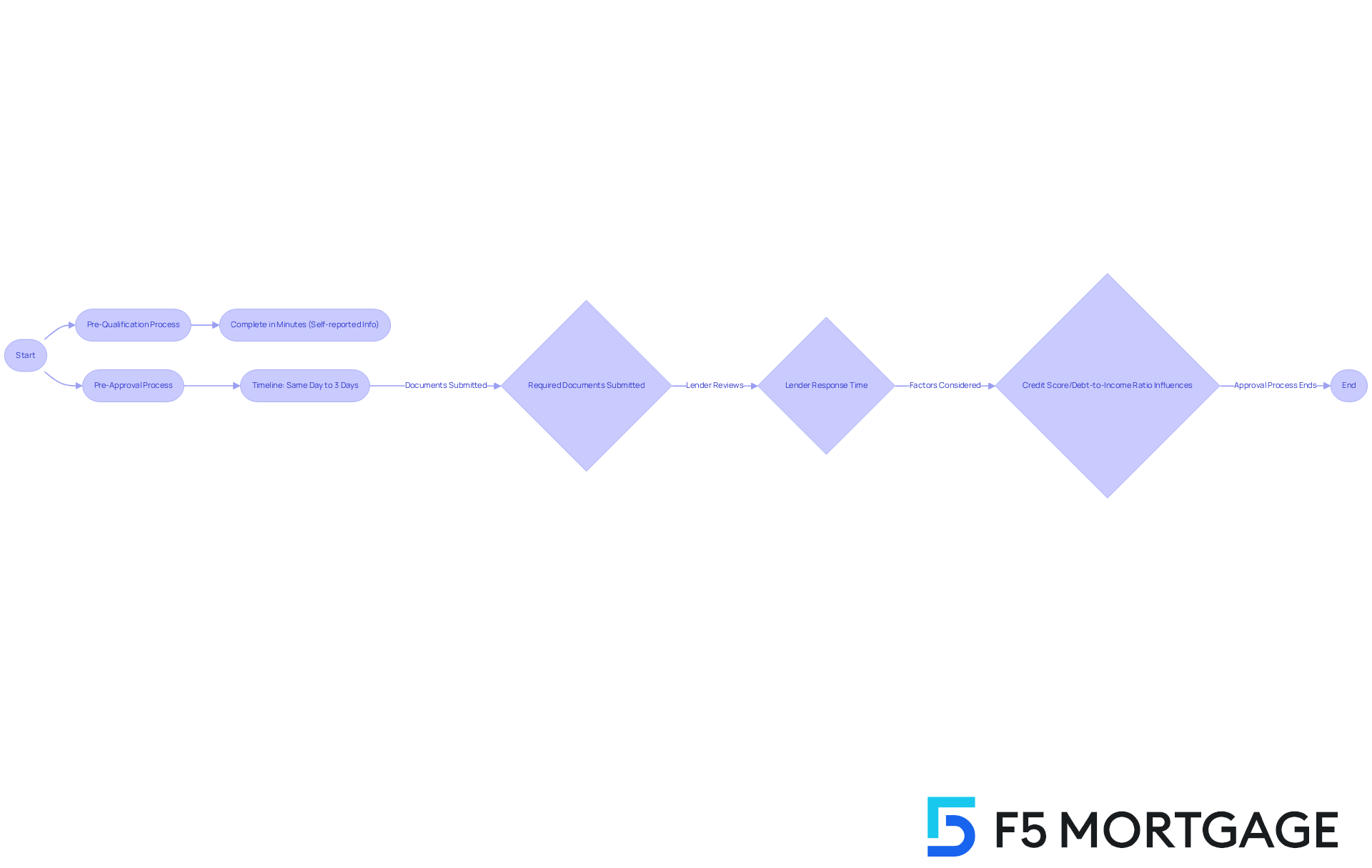
Benefits of Pre-Approval: Why It Matters for Homebuyers
Securing a status offers significant benefits for homebuyers, especially in today’s competitive market. A preliminary approval letter not only strengthens your position when making an offer but also . We know how challenging this can be, and in fact, many sellers prefer buyers with approval letters, as it suggests fewer hurdles in finalizing the transaction.
Moreover, . This clarity allows you to focus on properties within your price range, simplifying your property search and ultimately saving you time and reducing stress. With ‘s technology-focused approach, you can expect a swift and flexible approval process that enhances your home-buying experience. By knowing your borrowing limits and monthly payments, you can make informed decisions about your needs versus wants, leading to a more satisfying home-buying journey.
Real estate agents emphasize that knowing the difference between pre approved vs pre qualified . This enables you to respond quickly when the right property comes along. Such a proactive strategy is essential in a market where competition is fierce, and homes can sell rapidly. With F5 Mortgage‘s tailored support, you can confidently navigate the complexities of purchasing a property, ensuring you are well-prepared to make an offer when the opportunity arises.
Additionally, many of our clients have shared their positive experiences with F5 Mortgage, highlighting our . One happy client mentioned, “The group at F5 Mortgage made the initial approval process smooth and relaxing, allowing me to focus on finding my ideal home.” Furthermore, F5 Mortgage offers various that can significantly benefit families looking to upgrade their homes, making homeownership more accessible for everyone.
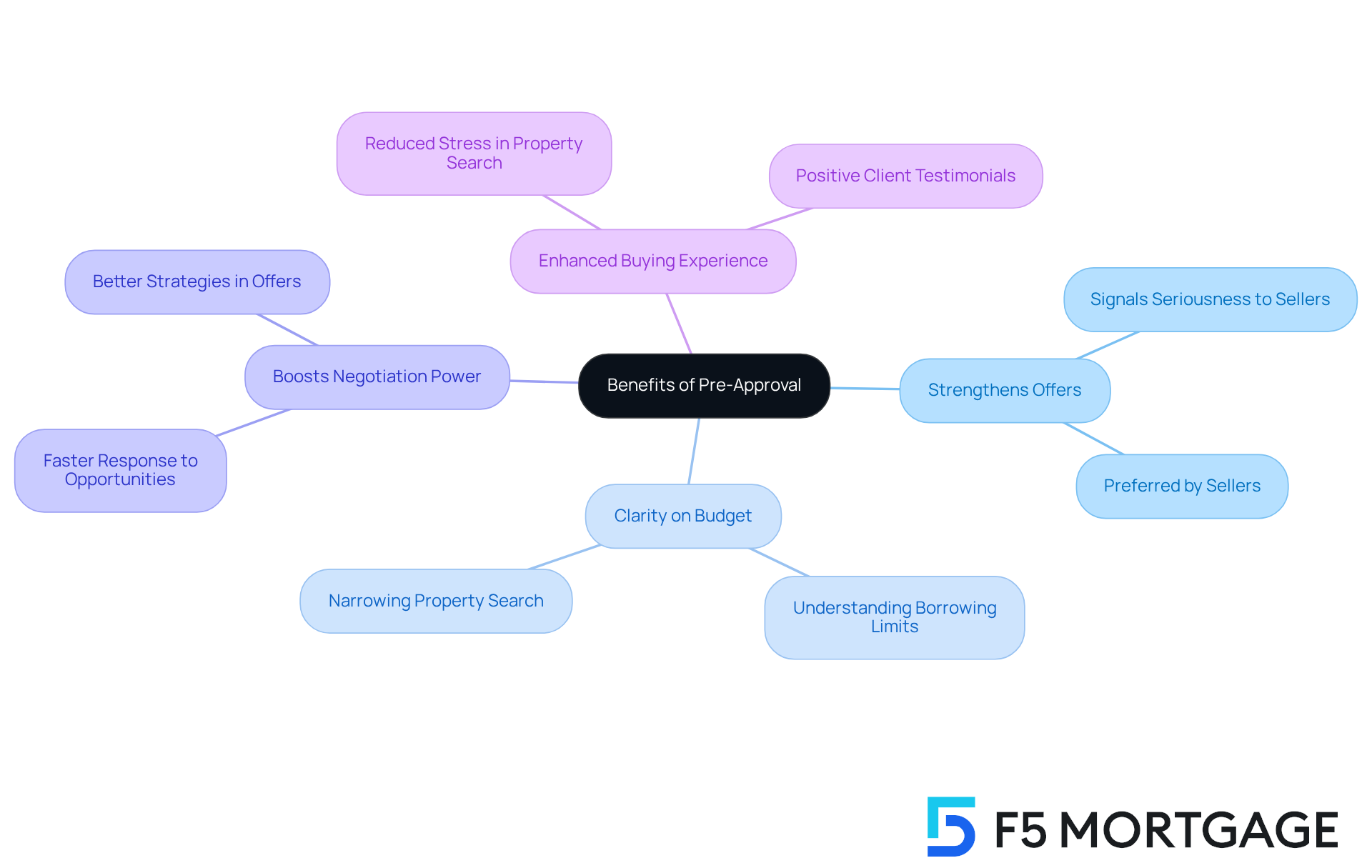
Common Misconceptions: Debunking Myths About Pre-Qualification and Pre-Approval
Many homebuyers face misunderstandings regarding mortgages, which can complicate their purchasing journey. We know how . A common myth is that the distinction between pre approved vs pre qualified guarantees loan approval. In reality, pre-qualification is merely an estimate based on unverified information and lacks the thorough assessment that lenders require.
Another prevalent notion is that prior authorization is unnecessary. However, acquiring , demonstrating to sellers that they are serious and financially capable. An approval from a lender indicates that, based on the financial details submitted, the buyer is a suitable candidate for a loan. This often includes an estimate of the loan amount, interest rate, and possible monthly payment.
Statistics reveal that many homebuyers misunderstand these terms, especially regarding pre approved vs pre qualified, with many believing that pre-qualification equates to a solid commitment from lenders. Insights from loan experts highlight the importance of between pre approved vs pre qualified processes. Prior authorization not only simplifies the purchasing process but also positions buyers advantageously in competitive markets.
When , it’s crucial to compare rates, costs, and terms to ensure they align with your needs. We’re here to support you every step of the way. F5 Mortgage offers and , making it a strong choice for homebuyers. By debunking these myths, homebuyers can with greater confidence and clarity.
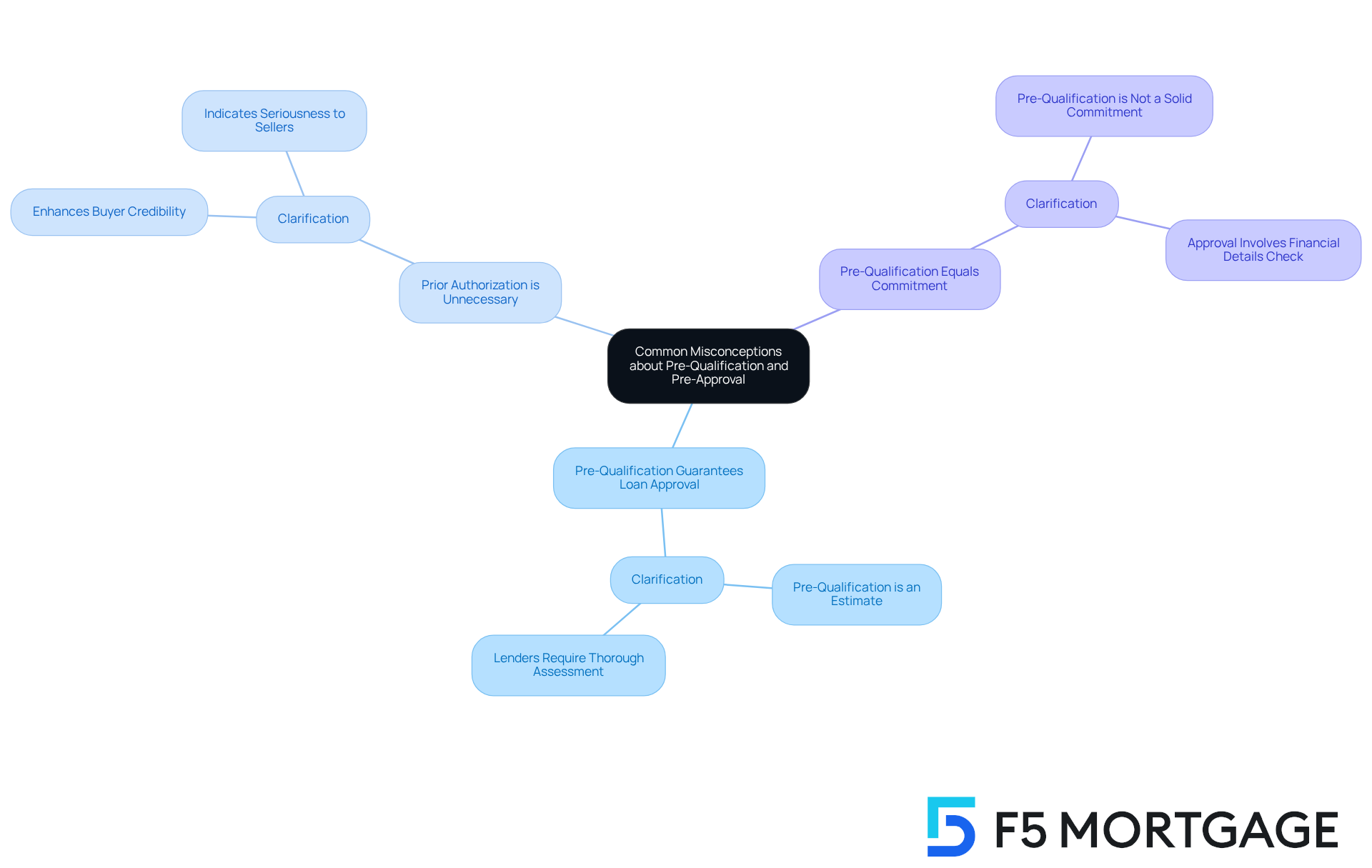
Choosing the Right Option: Pre-Qualified vs. Pre-Approved for Your Financial Situation
Selecting between pre-approved vs can feel overwhelming, especially when considering your financial circumstances and home-buying objectives. , providing a quick estimate of your borrowing potential without the need for extensive documentation. This option is ideal for those beginning their property search or wanting to gain a clearer understanding of their financial position.
On the other hand, , including income verification and credit checks. This makes it a stronger choice for serious buyers. A crucial aspect of this evaluation is your , which ideally should be below 43% to qualify for most mortgage loans. A better DTI can lead to more competitive mortgage rates, so it’s important to grasp this metric as you prepare for .
A preliminary approval letter not only outlines the loan amount you can secure but is also valid for 90 days. This boosts your credibility with sellers and demonstrates your commitment to acquiring a property. before stepping into the housing market. As one expert wisely noted, “Getting pre-approved is a smart step to take when you are ready to put in an offer on a home.”
It’s essential to remember that neither pre-approved vs pre-qualified offers a guarantee for a loan. In fact, 94% of home loan purchasers reported securing , underscoring its significance in the homebuying experience. Ultimately, by evaluating your financial preparedness, including your DTI and exploring offered by F5 Mortgage, you can make an informed choice that equips you for the mortgage journey ahead. We know how challenging this can be, and we’re here to support you every step of the way.
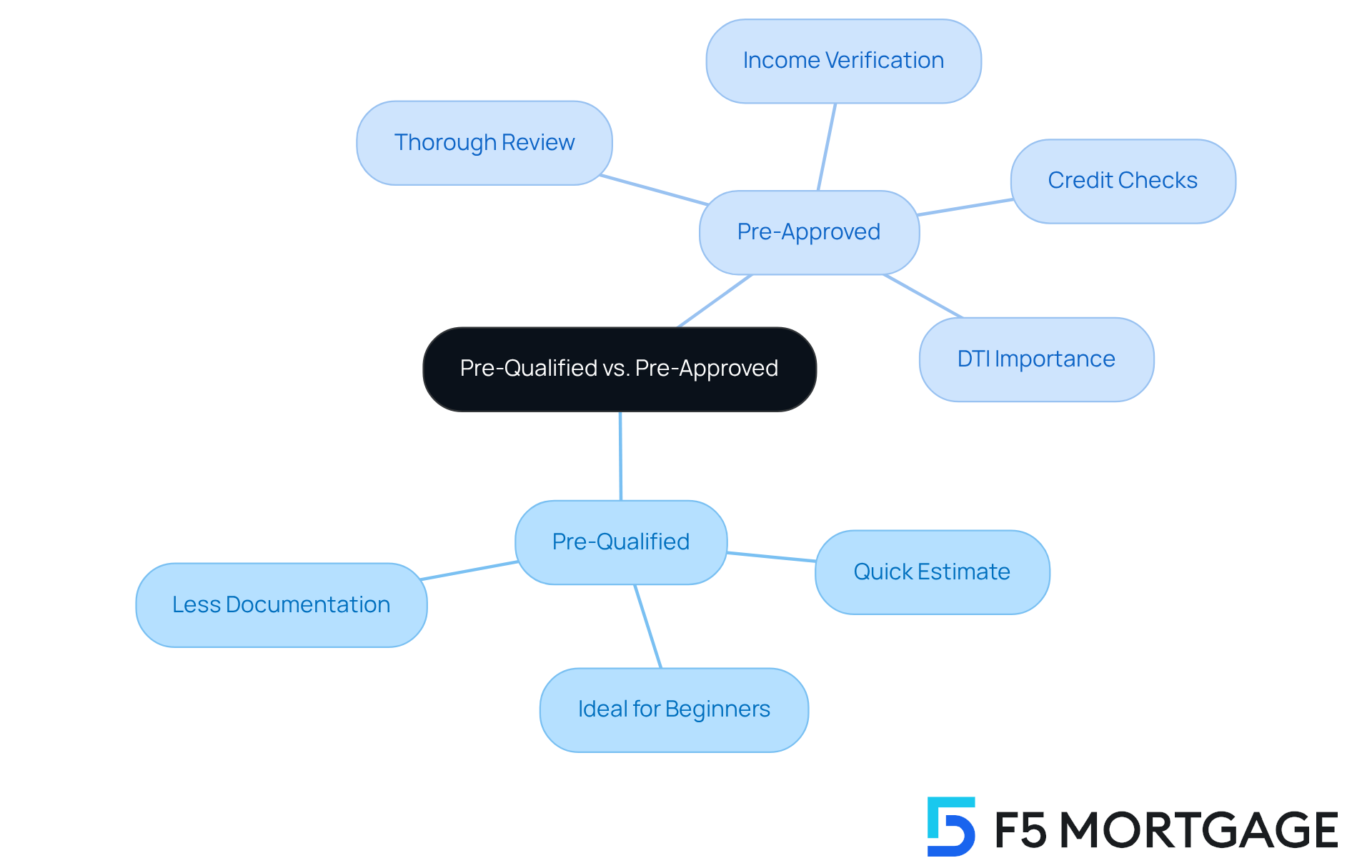
Lender Requirements: What Differentiates Pre-Qualification from Pre-Approval
Navigating the mortgage process can feel overwhelming, and we understand how challenging this can be. When it comes to , the good news is that they are generally less stringent. Often, you’ll only need to provide basic financial information, such as your income and expected down payment. This quick assessment allows potential buyers to gauge their without the burden of extensive documentation.
However, if you’re looking for prior authorization, be prepared for a more . This process demands detailed documentation, including:
- Recent pay stubs
- W-2 forms
- Tax returns
- Bank statements
- A credit report
While it may seem daunting, this comprehensive evaluation not only confirms your financial situation but also in the eyes of sellers. In competitive markets, the concept of is crucial, as prior approval is regarded more seriously, giving you an edge.
Understanding your is essential as well. Typically, a maximum of 43% DTI is needed for mortgage loans, which can significantly affect your eligibility for various . Remember, a is valid for 90 days, giving you a limited timeframe to find your dream home.
By grasping these and the implications of DTI, you can prepare effectively for each stage in your financing journey. We’re here to support you every step of the way, ensuring a smoother path toward homeownership.
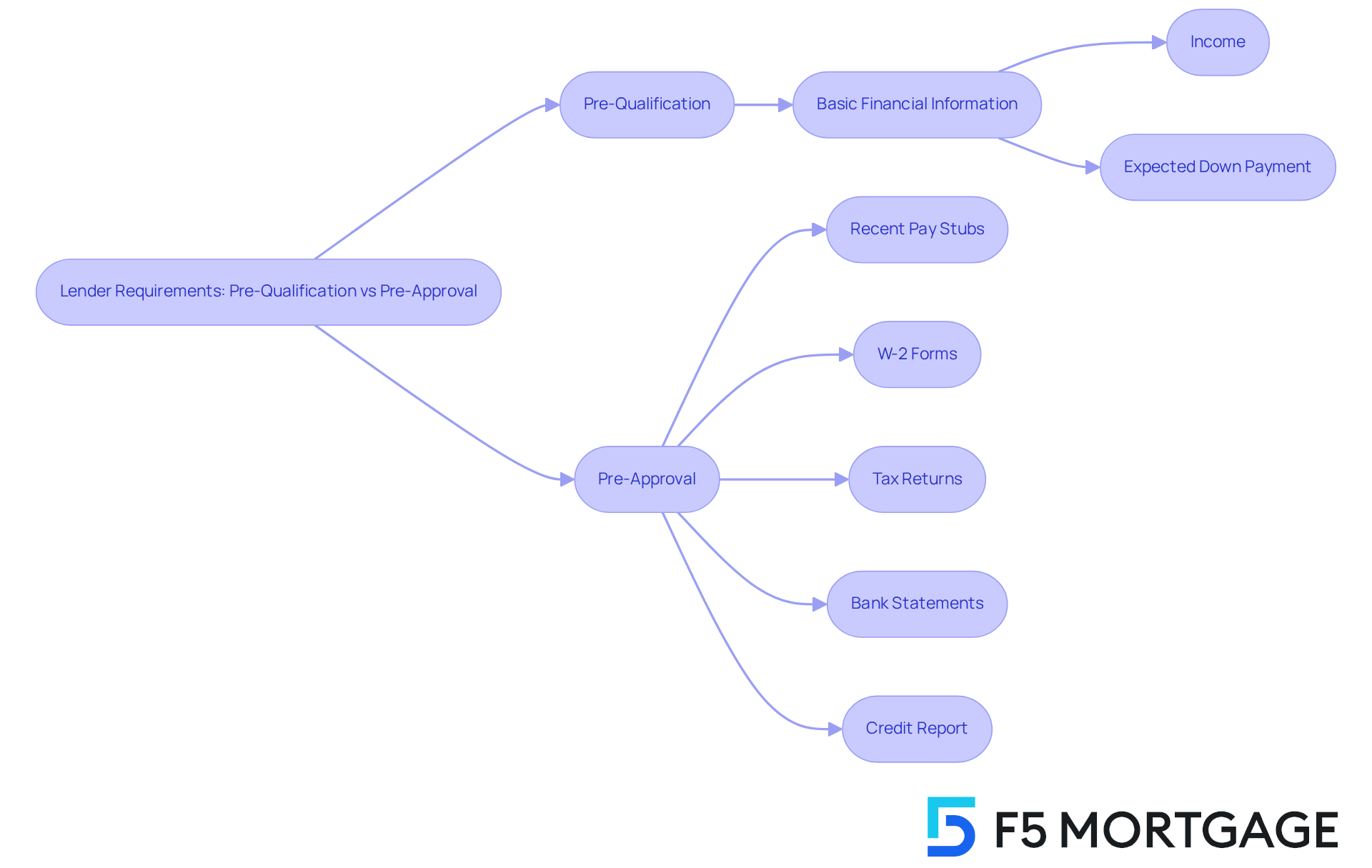
Summary of Key Differences: Pre-Qualified vs. Pre-Approved
In summary, we know how challenging navigating the mortgage process can be. Pre-qualification serves as a rapid, informal estimate of your borrowing ability, especially in the context of understanding lending options, based on self-reported information. On the other hand, the is that is a more formal procedure that involves a comprehensive assessment of your , leading to a conditional commitment from the lender.
When you receive approval, it indicates that you are a good candidate for a mortgage based on the financial information you provide. This often includes an estimate of your loan amount, interest rate, and potential monthly payment. For serious buyers, the distinction between pre approved vs pre qualified carries significant weight in the home-buying process, making it a crucial step.
Financial specialists emphasize that preserving a and managing debts efficiently can greatly enhance your likelihood of receiving prior approval. Typically, you can expect to receive your within 10 business days after submitting all necessary documentation.
Understanding , such as poor credit history or insufficient income, can also help you navigate the process more successfully. Furthermore, if you are considering , there are options available to change your loan term. This can help reduce your monthly payments or eliminate private mortgage insurance (PMI) if you qualify. Such flexibility can be particularly beneficial for families looking to upgrade their homes, and we’re here to support you every step of the way.
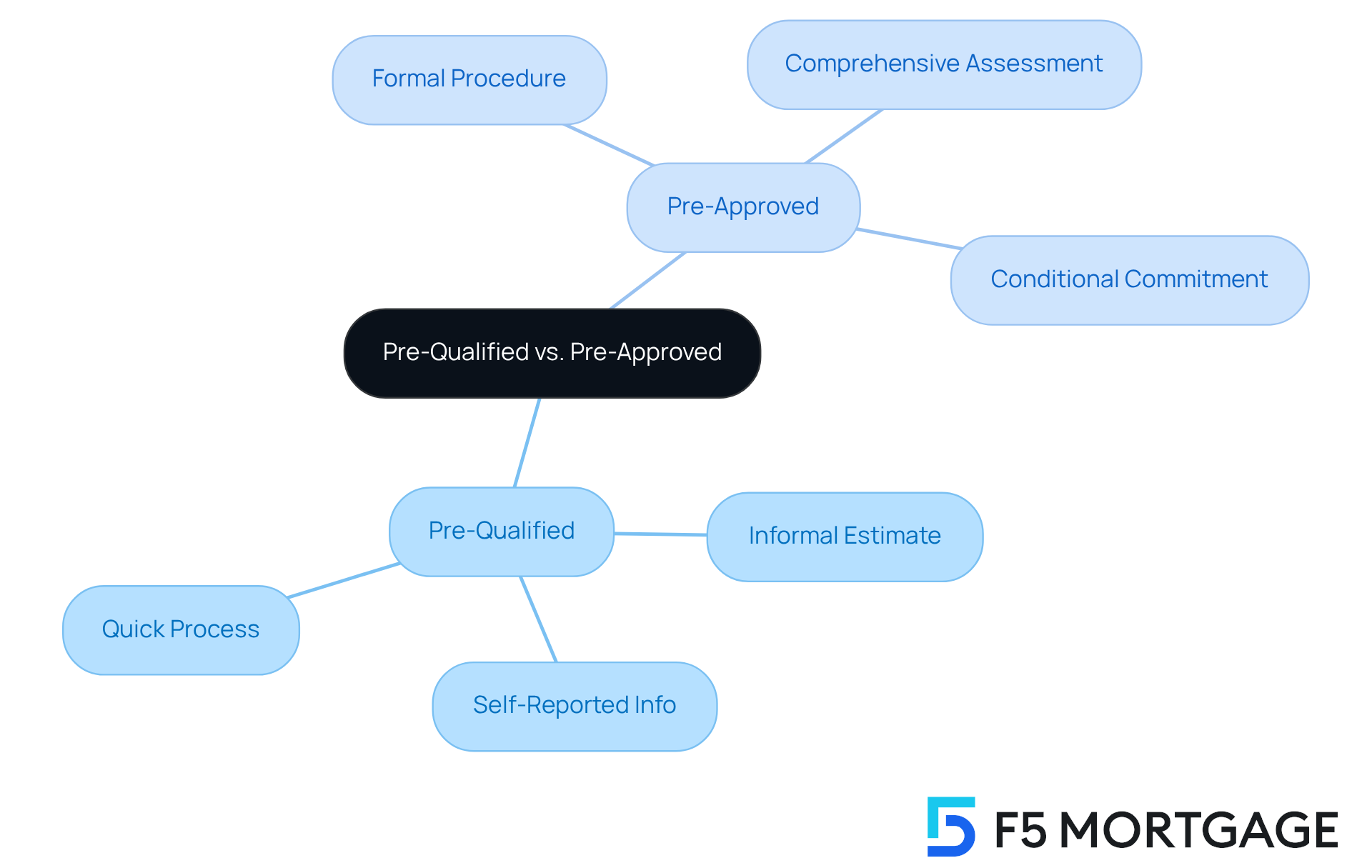
Conclusion
Understanding the nuances between pre-approved and pre-qualified mortgage options is crucial for homebuyers like you, especially in today’s competitive housing market. We know how challenging this can be, but grasping these distinctions can help you make informed decisions that streamline your home-buying journey and enhance your credibility with sellers. The choice between these two processes can significantly impact your overall experience and outcomes when securing a mortgage.
Throughout this article, we’ve highlighted key points, such as the quick and informal nature of pre-qualification compared to the thorough assessment involved in pre-approval. The benefits of obtaining pre-approval are clear:
- It provides a competitive edge.
- A clearer understanding of your budget constraints.
- A stronger position when making offers on properties.
Additionally, addressing common misconceptions surrounding these terms empowers you to approach the mortgage process with greater confidence and clarity.
Ultimately, taking the time to understand the differences between pre-approved and pre-qualified options can lead to smarter financial decisions and a smoother path to homeownership. As the housing market continues to evolve, being well-informed about these processes will enhance your readiness and ensure that you can act swiftly and decisively in securing your dream home. Embracing this knowledge is a vital step toward achieving your homeownership goals with confidence. We’re here to support you every step of the way.
Frequently Asked Questions
What services does F5 Mortgage offer?
F5 Mortgage provides personalized pre-approval and pre-qualification services, along with a diverse array of loan options, including fixed-rate, FHA, VA, and jumbo loans.
What is the difference between pre-approval and pre-qualification?
Pre-qualification is an initial estimate of how much you might be able to borrow, based on limited financial information. Pre-approval involves a more thorough evaluation, including a credit check and verification of income and assets, resulting in a conditional commitment from the lender.
How long does it take to obtain pre-approval from F5 Mortgage?
F5 Mortgage can provide pre-approval in less than an hour, simplifying the home-buying experience.
How long are pre-approval and pre-qualification letters typically valid?
Pre-approval and pre-qualification letters are usually valid for 60 to 90 days.
What information is required for mortgage pre-qualification?
To obtain pre-qualification, you typically need to provide information about your income, debts, and assets, including details like employment status, monthly expenses, and existing loans.
What documents do lenders commonly require for pre-qualification?
Common documents include recent pay stubs, tax returns, and bank statements. Many lenders may ask for at least two years of tax returns and W-2 forms to verify income.
Why is understanding the difference between pre-approved and pre-qualified important?
Understanding these distinctions is crucial because sellers often view pre-approved buyers more favorably, giving them a competitive edge in the housing market.
How long does the pre-qualification process typically take?
The pre-qualification process usually takes about 30 to 60 minutes to complete.
What are the benefits of working with F5 Mortgage?
F5 Mortgage emphasizes a personalized approach to enhance client satisfaction, providing tailored assistance and guidance throughout the mortgage process, leading to a smoother borrowing experience.








